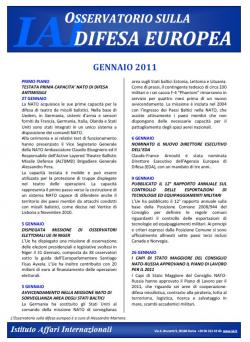Observatory on European defence, October 2007

15-16 October 2007
EU General Affairs and External Relations Council - Chad
The Council adopted a Joint Action which authorises the ESDP military operation EUFOR-TCHAD/RCA to support the deployment of a UN force in eastern Chad and in the northeast of the Central African Republic. The deployment, authorised by the UN Security Council (Resolution 1778), will secure the areas and related refugee camps and will have permission to use force. Up to 4,000 troops will be committed for an initial period of one year from spring 2008, the expected date of the statement of full operational capability. The force will be commanded by the Irish general Patrick Nash (headquarters in Mont Valérien, France). The French general Jean-Philippe Ganascia will be the operational commander (Paris will provide the largest contingent: about 1,500 troops).
About 100 million euros of common costs were allocated. The expected deployment for December will be assessed in the first force generation conference to be held on November 9th. General Nash underlined the difficulties related to the largeness of the territory: to date only 2,500 troops were made available instead of the 4,000 expected and the lack of infrastructures makes transport capabilities crucial (especially at tactical level).
18 October 2007
EU Capabilities - European Gendarmerie Force
France, Italy, Spain, the Netherlands and Portugal signed the constitutive treaty of the EUROGENDFOR, European Gendarmerie Force.
The intergovernmental structure for the coordination is a framework for coordinating military police forces that can be employed abroad for stabilization operations. It is funded by the participating states alone and was established according to a first agreement of September 2004.
The headquarters were established in Vicenza, Italy, inaugurated in January 2006.
The force (800 troops and 2,300 reserves) will be deployable in 30 days upon unanimous decision of the High Level Interministerial Committee, which insures political-military coordination. Although it is not an EU structure, the EUROGENDFOR can serve the EU - in such a case the Political and Security Committee of the EU (COPS) will assume the political control and the strategic direction of the force - and the main international organisations for security such as the UN, NATO, OSCE, and ad hoc coalitions.
18-19 October 2007
Lisbon European Council - Reform Treaty
The work of the Intergovernmental Conference, started in July 2007, closed with the approval of the text of the new Reform Treaty of the EU.
The treaty is expected to be signed on 13 December and ratified in order to enter into force before the elections for the European Parliament scheduled for June 2009.
The new text introduces some arrangements in the CFSP and ESDP fields.
For the former, the stability of the President of the Council is maintained. He will be elected through qualified majority voting and will remain in charge for two and a half years, with a possible one-time re-election.
A High Representative of the Union for Foreign Affairs and Security Policy was created (a wording less ambitious than the EU Minister of Foreign Affairs envisaged by the Constitutional Treaty): he will merge the competencies of the of the High Representative for the CFSP and the Commissioner for Foreign Relations, although maintaining different decision-making procedures. He will be elected by the European Council through qualified majority voting with the approval of the President of the Commission and will have power of initiative in the CFSP field.
As far as ESDP is concerned, the disposals of the Constitutional Treaty are maintained, namely: permanent structural cooperation, a clause of solidarity in case of catastrophe and terrorist attacks, and enlarged Petersberg tasks. Also maintained were the clause of collective defence, in the framework of the neutrality commitments of certain states and the affiliation to NATO, and the reinforced cooperation which, following specific procedures, will also be allowed in sectors with defence or military implications
24-25 October 2007
Informal Meeting of NATO Defence Ministers - ISAF mission in Afghanistan, Countering International Terrorism
The commitment in Afghanistan was at the centre of the discussions held at the informal meeting of NATO defence ministers. The need of increasing the troops found the backing of the ministers, and although no formal decision was taken, a force generation conference is scheduled for November. The problem of an increased commitment of the allies' contingents in the south of the country, the main area of Taliban's operations, remains unsolved.
The requests to increase the instructors for the basic training of the Afghan Army and for the basic training of the local security are a focal issue for the Alliance high level officers. France announced the redeployment of about 50 trainers (already present in the Kabul area) in the south of the country. Germany decided to triple the number of its trainers (currently 60) but to keep them in the north.
Also, the division of costs and the lack of transport capabilities remain open questions.
The initiatives for countering terrorist acts in the NATO framework continue: the formal meeting of the NATO defence ministers (24-25 October) supported, among its conclusions, the necessity of adopting a defence strategy against cyber attacks, while bioterrorism was at the centre of the workshop hosted by Romania on 25-26 October and aimed at developing a cooperation for defence and response in case of bio events.
-
Details
Roma, Istituto affari internazionali, 2007 -
Issue
07/10


